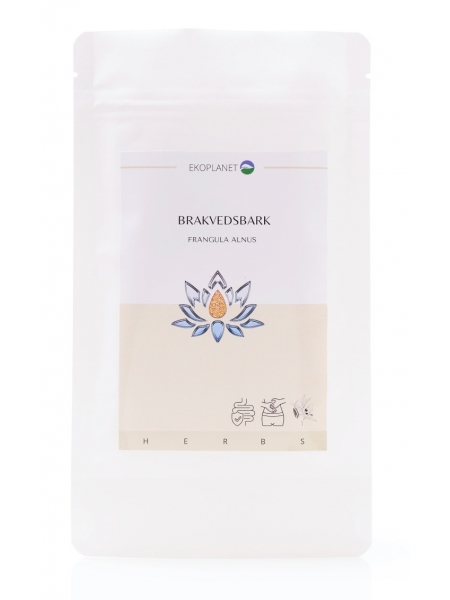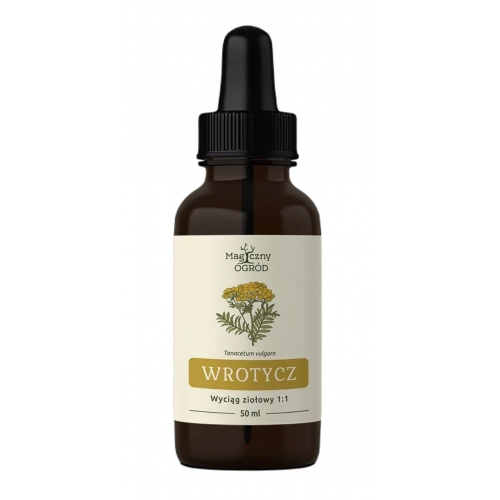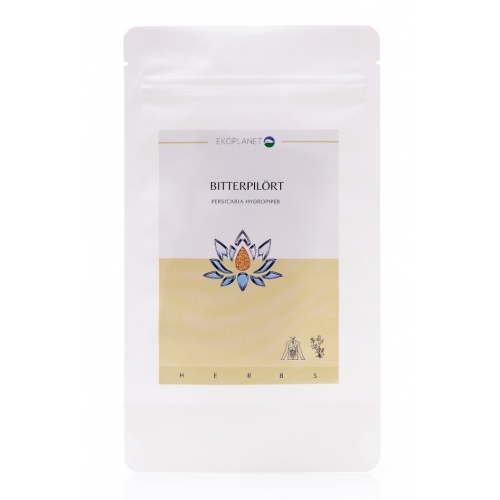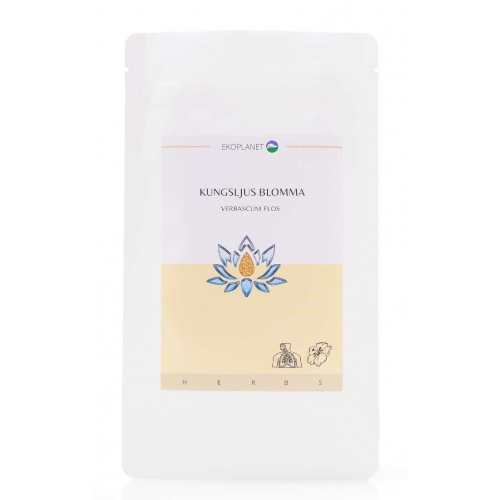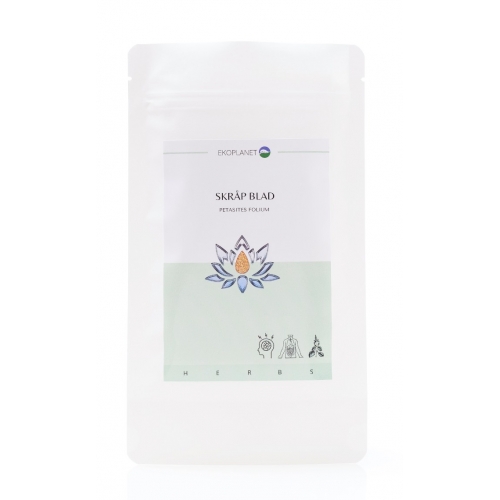Alder buckthorn - Frangula alnus 100 g
Alder buckthorn (Frangula alnus) is a shrub or small tree that occurs throughout our country in its natural state, with the exception of the mountain areas where it is rare. Alder buckthorn has interesting properties and contains bitter substances, alkaloids, glycosides, tannins, starch, sugars, ascorbic acid, tannins and mineral salts. ATTENTION! Overdose or long-term use can be harmful due to frangularoside (mostly in fresh bark) and tannic acid.
Comparative price: SEK 590/kg
Alder buckthorn occurrence
Alder buckthorn (Frangula alnus) is a shrub or small tree belonging to the family Rhamnaceae. Due to its low requirements, the plant is spread all over the world. It occurs in the forests of North Africa, Europe and northern China.
In Sweden, it occurs throughout our country in its natural state, with the exception of the mountain areas where it is rare. It is often seen along the shoreline as it thrives in moist, acidic soil. Very hardy and thrives in both sun and shade.
The plant blooms throughout the season with white-green, small flowers and bears red berries that turn black after a while. The birds like to eat the berries and spread them over large areas at the same time.
Alder buckthorn use
ATTENTION!
Alder buckthorn is not suitable for use as it can cause poisoning, abdominal pain and vomiting. Before the plant can be used, it must first be dried. During the drying process, it loses its harmful properties. Well-dried Alder buckthorn should break easily. It retains its properties for several years.
The leaves, bark and berries of the Alder buckthorn have been used in coloring. Using different methods, yarn can be dyed from Alder buckthorn in fine color shades.
The plant contains bitter substances, alkaloids, glycosides, tannins, starch, sugars, ascorbic acid, tannins and mineral salts and due to its content Alder buckthorn has bactericidal, antispasmodic, anti-inflammatory and diuretic properties. The plant also contains frangulin which has laxative properties and this is why the herb has long been known as a laxative.
Alder buckthorn contraindications and side effects
Overdose or prolonged use can be harmful! Do not use during pregnancy, breastfeeding, menstrual bleeding, appendicitis, kidney disease, abdominal pain of unknown etiology, children under 12 years, dehydration with loss of electrolytes, allergy to brackish bark.
Special warnings and precautions:
Do not use for a long time (maximum 7 to 14 days) without consulting a doctor. Do not use Alder buckthorn if symptoms such as severe abdominal pain, vomiting and flatulence occur, as they may indicate intestinal obstruction. For long-term use, a doctor's consultation is recommended.
Side effects:
During use, a hypersensitivity reaction to Alder buckthorn may occur. In addition, abdominal pain and diarrhea were observed. The presence of such symptoms indicates that the dose is too high. When using the herb, a change in the color of the urine may occur, which has no clinical significance. With chronic use or abuse, water-electrolyte imbalance can occur, especially loss of potassium, causing cardiac dysfunction and muscle weakness, especially when taking cardiac glycosides or diuretics. In addition, with chronic use, proteinuria, hematuria and pigment deposits in the colonic mucosa (pseudomelanos coli ) occur, which usually disappear after discontinuation of treatment. If any side effects occur, please inform your doctor.
Ingredients: Alder buckthorn bark (Frangula alnus)
Dosage: Adults and children over 12 years of age: Measure half a teaspoon of bark and pour a glass (200 ml) of lukewarm water. Bring to a boil, simmer slowly, covered, for 15 minutes. Set aside for 10 minutes and strain. Drink once before going to bed. It is not recommended to use it more than 2-3 times a week and for a longer period than 12 weeks. Contact a phytotherapist if you are unsure. Do not take a larger dose than a glass of decoction.
Storage: dry and dark
Country of origin: EU
ATTENTION!
Overdose or prolonged use can be harmful! Do not use during pregnancy, breastfeeding, menstrual bleeding, appendicitis, kidney disease, abdominal pain of unknown etiology, children under 12 years, dehydration with loss of electrolytes, allergy to Alder buckthorn.
Special warnings and precautions:
Do not use for a long time (maximum 7 to 14 days) without consulting a doctor. Do not use Alder buckthorn if symptoms such as severe abdominal pain, vomiting and flatulence occur, as they may indicate intestinal obstruction. For long-term use, a doctor's consultation is recommended.
Side effects:
During use, a hypersensitivity reaction to Alder buckthorn may occur. In addition, abdominal pain and diarrhea were observed. The presence of such symptoms indicates that the dose is too high. When using the herb kan a change in the color of the urine occurs, which has no clinical significance. With chronic use or abuse, water-electrolyte imbalance can occur, especially loss of potassium, causing cardiac dysfunction and muscle weakness, especially when taking cardiac glycosides or diuretics. In addition, with chronic use, proteinuria, hematuria and pigment deposits in the colonic mucosa (pseudomelanos coli ) occur, which usually disappear after discontinuation of treatment. If any side effects occur, please inform your doctor.

